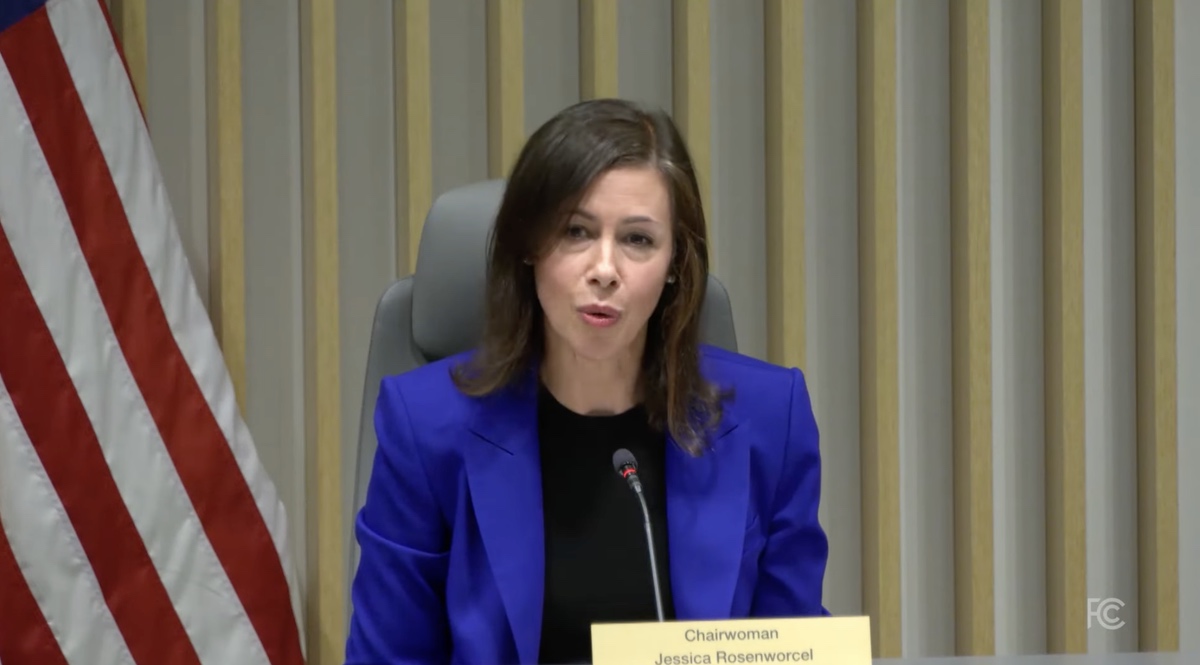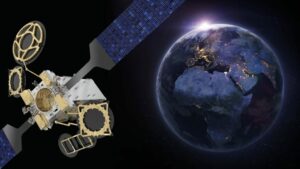
WASHINGTON — The Federal Communications Commission has clarified, but not altered, rules to mitigate orbital debris.
The five FCC commissioners voted unanimously during a Jan. 25 meeting to approve an order on reconsideration of rules it adopted in 2020. The order was a response to three petitions from industry seeking changes to the rules and how they are applied to satellite operators.
The order “will uphold the current regulatory environment for orbital debris mitigation while providing additional clarity and guidance for satellite operators, and reinforces the commission’s commitment to space safety,” said Julie Kearney, chief of the FCC’s Space Bureau, at the meeting.
One petition, by Boeing, EchoStar, Hughes Network Services, Planet, Spire and Telesat, asked the FCC to reconsider disclosure requirements on maneuverability and other technical aspects of licensed spacecraft that could “excessively encumber” the industry. The petition also questioned requirements that “diverge substantially” from other U.S. government guidance, like the Orbital Debris Mitigation Standard Practices (ODMSP).
The FCC concluded that there was nothing in its rules that was “fundamentally inconsistent” from other guidance, and that it had the ability to tailor the guidance of the ODMSP, which is intended only to apply to U.S. government missions. It also dismissed “speculative concerns” about overly burdensome disclosure rules, but did provide guidance on several technical topics.
A second petition, filed by SpaceX, sought to have the FCC’s rules applied to both U.S. companies licensed by the FCC as well as foreign companies that instead seek market access from the commission. The FCC, in the latter case, allows companies to instead demonstrate they are subject to “direct and effective regulatory oversight” by the country that authorizes them.
The FCC concluded that foreign companies seeking market access must provide supporting documentation to demonstrate they do follow orbital debris mitigation rules, an approach the commission said in its order “provides more flexibility and can serve the public interest better by being less burdensome.”
The third petition, from Amazon’s Project Kuiper, asked the FCC to include rules that establish orbital separation requirements between large constellations. The FCC rejected that request, concluding that coordination among satellite operators remains the “best solution for maintaining space safety” even as satellite constellations proliferate.
“In this decision, we reaffirm the updates that we made earlier to our orbital debris mitigation rules and offer additional guidance to satellite operators,” said FCC Chairwoman Jessica Rosenworcel. “We’re reinforcing our commitment to space sustainability.”
While the order passed unanimously, one commissioner, Nathan Simington, sided with SpaceX’s opposition to how the rules are applied to non-U.S. systems. “In practice, it often places U.S.-licensed providers, and ultimately the United States as a policy leader, at somewhat of a disadvantage,” he said, arguing that orbital debris rules in other countries are not as robust as those in the United States.
The orbital debris rules are one part of a “space innovation” agenda at the FCC. Rosenworcel said that the day before the meeting, she shared with fellow commissioners a proposal for licensing spacecraft for in-space servicing, assembly and manufacturing applications, something the FCC has been studying for several years.
Senate bill on space traffic management
The same day that the FCC approved the orbital debris order, a group of senators introduced legislation to authorize space traffic coordination activities underway by the Commerce Department’s Office of Space Commerce.
The Situational Awareness of Flying Elements in Orbit Act, or SAFE Orbit Act, would formally authorize the office to develop and operate a space traffic coordination system, including maintaining a public catalog and providing basic services at no charge. The Office is already developing such a system, called the Traffic Coordination System for Space or TraCSS.
“The SAFE Orbit Act would require the Office of Space Commerce to collect and share relevant data to strengthen our space situational awareness and space traffic coordination efforts,” said Sen. John Cornyn (R-Texas), lead sponsor of the bill, in a statement.
Co-sponsors of the SAFE Orbit Act include Sens. Gary Peters (D-Mich.), Marsha Blackburn (R-Tenn.), Eric Schmitt (R-Mo.), Mark Kelly (D-Ariz.), Roger Wicker (R-Miss.) and Kyrsten Sinema (I-Ariz.) The bill also has the support of the Commercial Spaceflight Federation, a space industry group.
- SEO Powered Content & PR Distribution. Get Amplified Today.
- PlatoData.Network Vertical Generative Ai. Empower Yourself. Access Here.
- PlatoAiStream. Web3 Intelligence. Knowledge Amplified. Access Here.
- PlatoESG. Carbon, CleanTech, Energy, Environment, Solar, Waste Management. Access Here.
- PlatoHealth. Biotech and Clinical Trials Intelligence. Access Here.
- Source: https://spacenews.com/fcc-reaffirms-orbital-debris-mitigation-rules/
- :has
- :is
- :not
- 2020
- 25
- a
- ability
- About
- access
- Act
- activities
- Additional
- adopted
- agenda
- allows
- already
- also
- altered
- among
- an
- and
- applications
- applied
- Apply
- approach
- approve
- approved
- ARE
- AS
- aspects
- Assembly
- At
- authorize
- awareness
- basic
- been
- before
- being
- Better
- between
- Bill
- Boeing
- both
- Bureau
- but
- by
- called
- CAN
- case
- catalog
- Changes
- charge
- chief
- clarified
- clarity
- collect
- Commerce
- commercial
- commission
- commissioner
- commitment
- Communications
- Companies
- concluded
- coordination
- could
- countries
- country
- Current
- data
- day
- decision
- demonstrate
- develop
- developing
- DID
- Disadvantage
- disclosure
- do
- documentation
- during
- Earlier
- Effective
- efforts
- elements
- Environment
- eric
- establish
- Even
- FCC
- Federal
- Federal Communications Commission
- Federation
- fellow
- filed
- five
- Flexibility
- flying
- follow
- For
- foreign
- Formally
- from
- Gary
- Government
- Group
- guidance
- had
- Have
- he
- How
- HTTPS
- in
- In other
- include
- Including
- industry
- instead
- intended
- interest
- introduced
- IT
- ITS
- Jan
- John
- jpg
- large
- lead
- leader
- Legislation
- less
- Licensed
- Licensing
- like
- made
- maintaining
- manufacturing
- mark
- Market
- meeting
- missions
- Mitigate
- mitigation
- more
- must
- network
- no
- nothing
- of
- offer
- Office
- often
- on
- ONE
- only
- operate
- operators
- opposition
- or
- Orbit
- order
- Other
- our
- overly
- part
- passed
- Places
- planet
- plato
- Plato Data Intelligence
- PlatoData
- policy
- practice
- practices
- project
- proposal
- provide
- providers
- providing
- public
- Questioned
- reaffirm
- reaffirms
- reconsider
- regulatory
- reinforces
- Rejected..
- relevant
- remains
- request
- require
- Requirements
- response
- robust
- rules
- s
- safe
- Safety
- Said
- same
- satellite
- Second
- Seek
- seeking
- SENATORS
- serve
- Services
- servicing
- several
- Share
- shared
- she
- solution
- something
- somewhat
- sought
- Space
- space industry
- spacecraft
- spaceflight
- SpaceX
- sponsor
- standard
- Statement
- States
- Strengthen
- Studying
- subject
- such
- support
- Supporting
- Sustainability
- system
- Systems
- Technical
- that
- The
- Them
- There.
- they
- Third
- this
- those
- three
- to
- Topics
- traffic
- u.s.
- U.S. government
- Ultimately
- unanimously
- Underway
- United
- United States
- Updates
- Uphold
- voted
- was
- we
- WELL
- which
- while
- with
- would
- years
- zephyrnet








